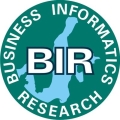3rd Workshop on The Value of Modelling (WOIS 2015)
in conjunction with 14th International Conference on Business Informatics Research, BIR 2015
Ontologies specify knowledge about entities, and their relationship and interactions. In conjunction with evolving semantic technologies for ontology engineering, representation and query, new ways open up for ontologies and information systems (IS) integration, combination and use.
In the structural perspective, ontologies can provide means to structure, store and access generic IS content. In the temporal perspective, ontologies can guide the development of new IS. They may help to choose appropriate processes, algorithms, rules, and software components depending on the requirements.
For both perspectives, a couple of research questions arise. Starting with the question for methods to structure IS content by the use of ontologies - What entities should be captured how in which context? – the range reaches to questions of knowledge discovery through ontology mining, and the use of ontologies for organisational design. And there are numerous other questions.
This workshop aims to bring together people who have strong interest in the use of ontologies in the context of enterprise information systems. We invite researchers and practitioners from both industry and academia to submit original results of their completed or on-going projects. We encourage broad understanding of possible approaches and solutions for the application of ontologies in information systems and systems development. Specific focus will be on practices and experiences, i.e. we encourage submission of case study and experiences papers, and of contributions bringing together business cases and enabling technologies.
The following topics are of relevance for the workshop, but are not limited to:
• Challenges in ontology use in information systems
• Literature surveys and systematic literature analyses
• IS concepts and architectures including ontologies or semantic technologies
• Business ontologies
• Application ontologies
• Ontological foundations for conceptual modeling
• Application of ontologies in Enterprise Modeling
• Ontology Design Patterns
• Knowledge Management
• Economic effects and relevance (business cases)
• Active information systems
• Ontology engineering
• Ontology based systems engineering
• Ontology based system validation and verification
• Knowledge fusion
• Ontology based knowledge discovery
• Experience reports about and show cases of ontology use
• Best Practices of ontology use
• Value modeling using ontologies
• Ontology based interoperability and integration solutions
• Ontology based competence modelling for human resource management systems
Submissions to WOIS 2015 have to be made by using the submission systems EasyChair. All accepted workshop papers will be published as CEUR online proceedings. Selected best papers (may be extended versions) will be invited for a special issue of the journal on Complex Systems Informatics and Modeling Quarterly (CSIMQ).
Papers submitted need to follow LNBIP formatting guidelines available from:http://www.springer.com/computer+science/lncs?SGWID=0-164-6-791344-0 .
Papers shall not exceed twelve pages (including figures, tables and appendices). Longer papers will not be included in workshop proceedings.
• Submission deadline – May 25th 2015 June 4th 2015
• Notification of acceptance – June 29
• Camera ready deadline (hard) – July 20
• Workshop date – August 26
Program committee chairs
• Birger Lantow, University of Rostock (Germany) (chair)
• He Tan, Jönköping University (Sweden) (co-chair)
Program committee (preliminary)
• Vladimir Tarasov, Jönköping School of Engineering (Sweden)
• Karl Hammar, Jönköping School of Engineering (Sweden)
• Kurt Sandkuhl, University of Rostock (Germany)
• Tatiana Levashova, St. Petersburg Institute Inform. & Autom. (Russia)
• Nikolay Shilov, St. Petersburg Institute Inform. & Autom. (Russia)
• Ralf D. Kutsche, TU Berlin (Germany)
• Eduard Babkin, Higher School of Economics Nizhny Novgorod (Russia)
• Marite Kirikova, Riga Technical University (Latvia)

